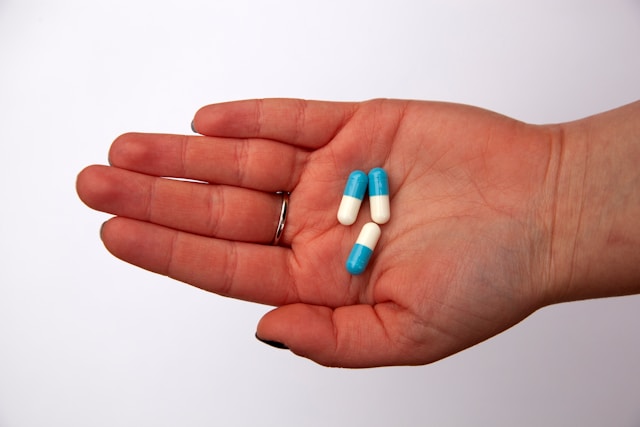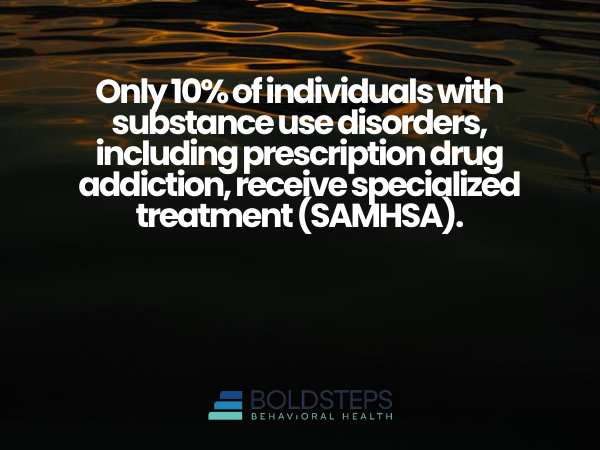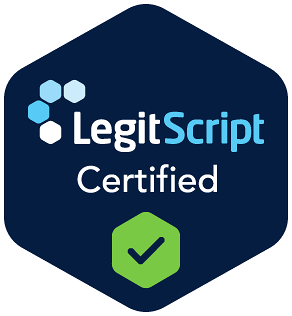Prescription drug addiction is a growing public health concern, affecting millions of individuals across the United States. Medications such as opioids, benzodiazepines, and stimulants are commonly prescribed for legitimate medical conditions, but their misuse can lead to physical dependence, addiction, and severe health consequences. Recovery from prescription drug addiction is possible, but it requires a comprehensive care approach that addresses the physical, emotional, and social aspects of addiction.
At Bold Steps Behavioral Health, we offer a full range of treatment options for individuals struggling with prescription drug addiction, including our Prescription Drug Addiction Program, Dual Diagnosis Treatment Program, Partial Hospitalization Program, and Virtual Treatment Program. By providing personalized, evidence-based care, we help individuals overcome addiction and achieve lasting recovery.
Understanding Prescription Drug Addiction
Prescription drug addiction occurs when individuals misuse medications, either by taking higher doses, using them for non-medical reasons, or continuing use despite harmful consequences. The most commonly misused prescription drugs include:
1. Opioids
- Examples: Oxycodone (OxyContin), Hydrocodone (Vicodin), Fentanyl
- Purpose: Prescribed for pain management
- Risks: Highly addictive and frequently linked to overdose deaths
2. Benzodiazepines
- Examples: Alprazolam (Xanax), Lorazepam (Ativan), Diazepam (Valium)
- Purpose: Used to treat anxiety, insomnia, and seizures
- Risks: Prolonged use can lead to dependency and severe withdrawal symptoms
3. Stimulants
- Examples: Amphetamines (Adderall), Methylphenidate (Ritalin)
- Purpose: Prescribed for attention-deficit/hyperactivity disorder (ADHD) and narcolepsy
- Risks: Misuse can cause heart problems, paranoia, and addiction
Prescription drug addiction can affect people of all ages and backgrounds. Recognizing the signs and seeking timely treatment is essential for preventing long-term harm.
Why Comprehensive Care is Crucial for Recovery
Recovery from prescription drug addiction is a multifaceted process. It’s not just about stopping drug use—it’s about addressing the root causes of addiction, managing withdrawal symptoms, treating co-occurring mental health disorders, and building a foundation for a healthier, substance-free life. A comprehensive care approach combines medical, psychological, and behavioral interventions to provide holistic support.
1. Medical Detox: The First Step
For many individuals, the first step in recovery is detoxification, which involves clearing the substance from the body. This process can be challenging and potentially dangerous without medical supervision.
The Role of a Medical Detox Program
- Safe Withdrawal Management: Withdrawal symptoms from prescription drugs like opioids or benzodiazepines can include nausea, seizures, anxiety, and insomnia. Medical detox ensures that these symptoms are managed safely.
- Medication-Assisted Treatment (MAT): MAT is often used during detox to reduce cravings and withdrawal symptoms. For example, buprenorphine or methadone may be used for opioid addiction, while tapering strategies are used for benzodiazepines.
- Stabilization: Detox provides the physical and emotional stability needed to transition into further treatment.
A Medical Detox Program is a critical foundation for recovery, allowing individuals to safely begin their journey toward sobriety.
2. Addressing Mental Health Through Dual Diagnosis Treatment
Prescription drug addiction often co-occurs with mental health disorders such as anxiety, depression, PTSD, or bipolar disorder. These conditions can fuel substance use, creating a vicious cycle that makes recovery more challenging.
Why Dual Diagnosis Treatment is Essential
- Integrated Care: Dual diagnosis treatment addresses both addiction and mental health simultaneously, ensuring comprehensive healing.
- Therapeutic Approaches: Evidence-based therapies like Cognitive Behavioral Therapy (CBT) and Dialectical Behavior Therapy (DBT) help individuals manage mental health symptoms without relying on substances.
- Trauma-Informed Care: Many individuals misuse prescription drugs to cope with unresolved trauma. Addressing these underlying issues is critical for long-term recovery.
At Bold Steps Behavioral Health, our Dual Diagnosis Treatment Program is designed to provide personalized care for individuals with co-occurring disorders.
3. Tailored Levels of Care
Addiction recovery is not a one-size-fits-all process. A comprehensive care model offers multiple levels of care to meet individuals where they are in their recovery journey.
Treatment Options at Bold Steps Behavioral Health
- Partial Hospitalization Program (PHP): PHP provides structured, intensive care during the day, combining individual therapy, group counseling, and medical support. It’s ideal for individuals who need significant support but do not require 24/7 supervision.
- Intensive Outpatient Programs (IOP): IOP offers flexibility, allowing individuals to attend therapy sessions multiple times a week while balancing work or family responsibilities.
- Outpatient Treatment Program: This program provides ongoing therapy and support for individuals in the later stages of recovery, helping them maintain their sobriety.
- Virtual Treatment Program: For those unable to attend in-person sessions, our virtual program delivers high-quality care online, making recovery accessible and convenient.
Offering these varied levels of care ensures that individuals receive the right amount of support at every stage of their recovery.
4. Behavioral Health Treatment for Long-Term Success
Addiction impacts more than just physical health—it affects emotional well-being, relationships, and daily functioning. Behavioral health treatment addresses these broader aspects of recovery.
Key Components of Behavioral Health Treatment in New Hampshire
- Individual Therapy: Provides a safe space to explore the root causes of addiction and develop healthier coping mechanisms.
- Group Therapy: Builds a sense of community and accountability by connecting individuals with peers who understand their struggles.
- Family Therapy: Helps rebuild trust and improve communication within families affected by addiction.
- Life Skills Training: Teaches practical skills like stress management, goal setting, and relapse prevention.
At Bold Steps, our Behavioral Health Treatment in New Hampshire is an integral part of our comprehensive care model, promoting holistic healing.
5. Holistic Approaches to Recovery
In addition to traditional therapies, holistic approaches play an important role in comprehensive care. These methods focus on healing the mind, body, and spirit, enhancing overall well-being.
Holistic Services at Bold Steps
- Mindfulness and Meditation: Helps individuals reduce stress and improve emotional regulation.
- Exercise and Nutrition: Restores physical health and supports mental clarity.
- Creative Therapies: Art, music, and writing therapy allow individuals to express emotions and discover new passions.
Holistic care complements evidence-based treatments, creating a well-rounded recovery experience.
Why Bold Steps Behavioral Health?
At Bold Steps Behavioral Health, we are dedicated to helping individuals overcome prescription drug addiction through compassionate, evidence-based care. Our programs are designed to support every stage of recovery, providing the tools and resources needed for lasting success.
What Sets Us Apart?
- Personalized Treatment Plans: Every individual’s recovery journey is unique, and we tailor our programs to meet their specific needs.
- Experienced Team: Our licensed therapists, medical professionals, and addiction specialists bring extensive expertise to every aspect of care.
- Full Continuum of Care: From detox to outpatient services, we offer comprehensive support throughout the recovery process.
- Convenient Options: With both in-person and virtual programs, we make recovery accessible for everyone.
Conclusion
Prescription drug addiction is a complex condition, but recovery is possible with the right support. Comprehensive care addresses the physical, emotional, and behavioral aspects of addiction, providing individuals with the tools they need to rebuild their lives. At Bold Steps Behavioral Health, we are committed to helping individuals take bold steps toward lasting recovery.
Take the first step today. Call us at (603) 915-4223 or visit Bold Steps Behavioral Health to learn more about our Prescription Drug Addiction Program, Dual Diagnosis Treatment Program, and other services. Together, we can help you reclaim your life and build a healthier future.
FAQ on Comprehensive Care for Prescription Drug Addiction
What is prescription drug addiction?
Prescription drug addiction occurs when individuals misuse prescribed medications, such as opioids, benzodiazepines, or stimulants, by taking higher doses, using them for non-medical purposes, or continuing use despite harmful consequences.
What are the signs of prescription drug addiction?
Common signs include:
- Taking medication in higher doses or more frequently than prescribed.
- Experiencing withdrawal symptoms when not using the drug.
- Doctor shopping to obtain multiple prescriptions.
- Neglecting responsibilities at work, school, or home.
- Prioritizing substance use over relationships or daily activities.
What is comprehensive care for prescription drug addiction?
Comprehensive care combines medical detox, therapy, mental health treatment, and holistic approaches to address all aspects of addiction. It focuses on the physical, emotional, and social needs of individuals for lasting recovery.
Why is medical detox important for prescription drug addiction?
A Medical Detox Program is critical for safely managing withdrawal symptoms, especially for drugs like opioids and benzodiazepines, which can cause severe physical and psychological effects during detox.
What is dual diagnosis treatment, and why is it essential?
Dual diagnosis treatment addresses both addiction and co-occurring mental health disorders, such as anxiety or depression. Treating both conditions simultaneously improves recovery outcomes and reduces the risk of relapse.



